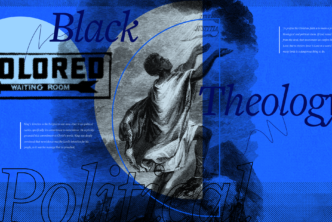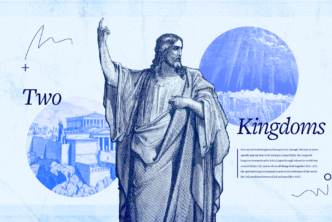Joan Osborne’s 1995 pop hit “What If God Was One of Us?” asked an excellent question. Another song—a famous hymn of Charles Wesley and George Whitefield—gives the correct answer. “Hark! The Herald Angels Sing,” written in 1739, declares:
Veiled in flesh the Godhead see,
Hail th’ incarnate Deity!
Pleased as man with man to dwell,
Jesus our Immanuel.
The ancient world had many deities, even some allegedly born of a virgin. It had its demigods and its deified human beings. This Christmas season, we cannot say that the baby Jesus was “God with us” until we first know what the word “God” means in a world that knew many.
Table of contents
What if God was one of us?
The Christian claim that Jesus is God is at one level rather straightforward. The divine nature, the deity of Jesus, is affirmed in several places in the New Testament. In the Gospel of John, Jesus is the “Word” who was “with God,” “was God,” and “became flesh” (John 1:1–2, 14), and in his resurrected body is hailed by Thomas as “my Lord and my God” (John 20:28). Paul, for his part, says Jesus is “the Messiah, who is God over all, forever praised!” (Rom 9:5). Paul also applies to Jesus several Yahweh-texts from the Old Testament, such as Isaiah 45:23 in Philippians 2:9–11. There can be no debate as to whether the early church identified Jesus as divine; they clearly did so. In fact, the developing church of the second century carried forward this affirmation of Jesus’s divinity with gusto and increasing intensity and conviction. For example, bishop Ignatius of Antioch, in the first quarter of the second century, concluded a letter to bishop to Polycarp with the words, “I bid you farewell always in our God Jesus Christ” (Pol. 8.3). Slightly later, Justin Martyr declared Jesus to be “Lord and God the Son of God” who is “deserving to be worshipped as God and as Christ” (Dial. Tryph. 63, 128).
Complications
So Jesus is God, plain and simple, and that settles that issue—except that there are a few complications that we have to consider first.
There is an unstated complexity in saying that Jesus is God, divine, a deity, or the Second Person of the Trinity. As N. T. Wright points out, we often think we know what the word “God” means, and all we need to do now is figure out who “Jesus” was, is, and continues to be. But the problem might be the other way around. Jesus, as both a figure of history and the object of the church’s devotion, might be the known entity, and the challenge is to figure what is the species of divinity that was attributed to Jesus.
In other words, when the apostolic and post-apostolic generations called Jesus “God,” what did they mean? Well, the truth is that there were several different ways of being a divine being in antiquity, and many options were canvassed and explored in church history when it came to identifying Jesus as “God.”
For some, Jesus was divine in the sense of being a supreme angel, the firstborn within the cosmos, yet subordinated to the Father in nature and rank (Arianism). For others, Jesus was divine in the sense that he was a manifestation of the Father in a new mode of existence (Sabellianism). For others, Jesus was divine in the sense of a human being who had become inhabited by an angel (Ebionites) or a human being who had been deified upon his resurrection (Theodotians). For others, Jesus was divine in the sense of being an inferior yet perfect aeon sent from the heavenly fullness to give humans true knowledge of the Father (Valentinians). For others, too, Jesus was divine in the sense of being the eternal Son who possessed the same divine nature as God the Father, eternally begotten of the Father, true God of true God, who took on human flesh in his life as the man Jesus of Nazareth (Nicene Creed). Note that all these views affirm Jesus’s divinity, but they differ over how he acquired it, how it manifests itself in Jesus’s life, and how it relates to the divinity of God the Father.
Thus, the question is not: Is Jesus divine? Rather, the $64,000 question is: In what sense is Jesus divine? What type of God/god has come to us in the person of Jesus?
The Greco-Roman context of ancient divinity
We should start by briefly looking at the various species of divinity in antiquity.
Divine hierarchy
In ancient religion, divinity was a pyramid, so that between the supreme god(s) and humans were a class of intermediate beings including cosmic bodies, angels, spirits, demons, heroes, and demigods. It would be possible, then, to say that Jesus is divine as someone who sits within a pyramid of various divine beings.
Ancient mythology
Comparisons between the Christian accounts of Jesus and other deities were made by pagan critics such as Celsus and Porphory—similarities were also noticed by early Christian theologians like Justin Martyr. From the virgin birth, to Jesus’s miracles, to his atoning death, to resurrection, to ascension into heaven—all these features of Jesus’s life have parallels to some degree or another with Greco-Roman myths and stories about deities and semi-divine beings. Justin Martyr in one single paragraph can say that Jesus originated like Mercury, the angelic word of God; he was born of a virgin like Perseus; he healed the sick like Asclepius; and he suffered like the sons of Jupiter (Justin, 1 Apol. 22). Jesus could have divinity ascribed to him in the same sense that mythological figures were also considered divine.
Ruler cults
Near Eastern and Greco-Roman ruler cults venerated rulers as divine beings. Alexander the Great was proclaimed as divine during his lifetime and later had a cult set up in his honor. The Romans adopted the practice of worshipping and then deifying many of their emperors. By the first century, the various imperial cults (i.e., the diverse forms of worship of living and deceased emperors) were among the most significant aspects of the Mediterranean religious landscape. The imperial cult became a civic instrument to bind together the emperor, local elites, and the people. To this end, the empire was saturated with temples, altars, images, inscriptions, and coins honoring the emperors and their families. The underlying premise is that divinity was a matter of power; therefore, the most powerful man in the known world, like the Roman emperor, was somewhere between the lowest of the gods and the greatest of men. If one reads of the ascension of Jesus and of how he is thereafter declared to be “Lord and Messiah” (Acts 2:36), one could be reminded of the alleged apotheosis or deification of Roman emperors who were thought to ascend to celestial heights of divine status upon their death.
Philosophy
Greco-Roman philosophy had its own theologies about the nature of divinity and the divinity of nature. Discussion encompassed gods, their bodies, their abodes, and their interests (or lack thereof) in the affairs of human beings. This bequeathed to the first Christian theologians a toolbox of categories for speaking about deity in relation to the world. Case in point, John the Evangelist, Justin Martyr, Clement of Alexandria, Origen, and Athanasius applied Heraclitus’s category of the Logos, a cosmic intermediary principle, to describe Jesus as the eternal Word of the Father made flesh. So Greco-Roman philosophy, especially Plato, provided a grammar and conceptual tools for thinking of Jesus as divine.
In sum, whatever differences there were between Christianity and Greco-Roman “religion,” those differences can only be pronounced once we have first grappled with the many similarities between Christianity and Greco-Roman accounts of divinity. Such similarities, it turns out, are not hard to find.
That said, Greco-Roman ideas, “theology,” religion, culture, and literature were not the predominating influence on early Christianity and its accounts of Jesus. I take it as evident that Jewish texts and traditions exercised the strongest pressures upon the primitive church’s thought about Jesus as a divine being. What really drove, shaped, and formed early accounts of Jesus was largely three things.
- The memory of Jesus, his life, prophetic career, miraculous deeds, teachings, and death.
- The experience of Jesus as the resurrected Son of God and the living and exalted Lord who was, in a special way, to be experienced through the Spirit and in the life of the church, its worship and communal life together.
- A re-reading of the Old Testament in light of their memory and experience of Jesus. In fact, the early church began to reinterpret the Old Testament in light of their messianic faith, leading to what I’d call a “messianic midrash” that understood scriptural prophecies and patterns as pointing to Jesus and Jesus as the key to unlocking the unity of the Holy Scriptures. This is why Old Testament texts like Psalms 110:1; 2:7; 118:22–24; 16:10–11; Daniel 7:13–14; and Isaiah 53:11–12 became so important to the early church. So while Greco-Roman influences are important as backdrop, Jewish texts and traditions provided the colors in which Jesus was regarded, identified, and described as a divine person.
Let’s take the book of Hebrews, which is by far the New Testament book that contains the most acute atmosphere of Platonic thinking and a clear deployment of Hellenistic rhetoric techniques in its style of argumentation. Hebrews is a book that clearly resonates with Hellenistic Judaism, as it is undoubtedly Hellenistic in language, texture, and technique. However, 25 percent of the contents of Hebrews derived from quotations of the Greek translation of the Old Testament and its Christology is constructed within a constellation of Psalms, patriarchal narratives, and Jewish notions of priesthood and kingship. For all its Hellenistic tropes, the epistle to the Hebrews is a thoroughly Jewish work. Thus, without playing Greco-Roman and Jewish influences against each other, I believe the Jewish context will be primary for mapping precisely how the early church regarded Jesus as divine, to which I now turn.
The Jewish context of early Christology
Shifting our focus to the Jewish background of early Christology, the immediate thing we have to acknowledge is the importance of Jewish monotheism.
The problem is that “monotheism” is a slippery term and a contested concept. If by monotheism we mean the existence of one and only one God, then monotheism is a misnomer. It does not explain the world of the Old Testament or intertestamental and Second Temple Jewish literature. Ancient Jews did not believe in the existence of only one God. They knew there were many gods, angels, spirits, demons, and so forth. The heavens were populated with a plethora of heavenly beings. We see this attested in places such as Psalm 82, where we read that “God presides in the great assembly; he renders judgment among the ‘gods’” (Ps 82:1 NIV). This explains why Paul can say that there are “many lords and many gods” (1 Cor 8:5), refer to the “god of this age” (2 Cor 4:5), and the “rulers of this age” (1 Cor 2:8). As a result of this observation, many scholars argue that ancient Jews were not monotheists but henotheists, loyal to one specific deity above other divine beings, and characterized by an “aniconic monolatry,” that is, an imageless and exclusive worship of Israel’s one deity.
Be that as it may, Israel’s exclusive worship and devotion to their God was often couched in such terms that it did sound a lot like actual monotheism.
First, Israel’s God might not be the only divine being—there were the gods of the Egyptians and Babylonians—but their God was God of creation, the uncreated Creator, not a mere tribal deity, not a god of trees or seas, but a universal Lord. This meant that Israel’s God was distinct from all other realities, whether heavenly or terrestrial, angels or archons, principalities or powers. These other beings were in fact part of the created order that owed its existence to him. God had categorical supremacy and supreme uniqueness in his dominion over earthly creatures and heavenly councils. God was separate from the world as its creator, whereas the Near Eastern and Greco-Roman gods, in the majority of cases, were the mightiest forces within the world and did not stand outside of it. This is reflected in the claims about God’s unique prerogatives and relationship with Israel in Second Temple Jewish literature. Thus, Israel’s God was in his own league, unrivaled.
Second, God had revealed himself with the unique name Yahweh (יהוה), with a unique identity as Israel’s deliverer. In fact, what is unique about Yahweh is that Yahweh is the God of Israel, who delivered them from slavery in Egypt, who gave them the land of Canaan, who made a covenant with them, who gave them the Torah, and who promises to be their God. Yahweh, then, is not a singular and solo deity; there are other divine beings, but Yahweh is species unique; there is no other angel or deity in his league. When that point is accented, the language and rhetoric can sound like an absolute monotheism. This is why when Namaan the Syrian was healed from his leprosy on taking Elisha’s advice, he exclaimed, “Now I know that there is no God in all the world except in Israel” (2 Kgs 5:15)—a statement which does sound a lot like Israel’s God is the only God there is, or at least, the only God with such power!
We should also note that precisely because Israel’s God was so transcendent, not to be reduced to forces of nature, and so “other,” this meant that God could only interact with the world through heavenly agents like angels, the Spirit, or personification of divine acts like the divine Word and Wisdom. Many of these figures are ambiguous in terms of their status. For instance, the “Angel of the Lord” is a very curious figure, since this angel is not Yahweh, but often speaks for Yahweh in the first person. Israel’s kings can even be described with divine rhetoric like “mighty God” (Hebrew text) or “angel of the great counsel” (Greek text) in Isaiah 9:6. So, as much as Yahweh was species unique, there were still ambiguities in the status and language used to described divine beings (like angels) and divine servants (like prophets and kings).
Further, we have to appreciate that in antiquity God/gods were benefactors and saviors of their people. Therefore, anyone who acted as a savior or benefactor for a group of people could be valorized using divinely freighted language. Again, divinity was conceived as power, so powerful humans could be regarded as lesser, scaled versions of divinity.
We can observe this in relation to biblical and post-biblical traditions about Moses. In Exodus, Moses is ordered by Yahweh to keep pestering Pharaoh despite Moses’s own feelings of inadequacy. Moses is encouraged with the promise that he will have god-like power and Aaron will be his prophet: “And the Lord said to Moses, ‘See, I make you as God to Pharaoh; and Aaron your brother shall be your prophet’” (Exod 7:1; cf. 4:16). This sounds almost like the Islamic creed: “There is no God but Allah and Muhammed is his prophet.”
In the reception history of Exodus 7:1, we find many authors eulogizing and venerating Moses in ways that accent his elevated status. Ben Sirach venerated Moses’s memory by saying that God made Moses “equal in glory to the holy ones, and made him great, to the terror of his enemies” (Sir 45:2–3). In the Qumran scrolls, Moses is called “a god over the mighty” (4Q374 II 2.6). Philo designated Moses as “god and king of the whole nation” (Philo, Vit. Mos. 1.155–58). In a Hellenistic work from Egypt, known to us as the Exagōge, which is a dramatic retelling of the Exodus, Jethro has a dream where Moses is not only invited onto God’s throne, but God vacates his throne for Moses, and stars then parade before Moses like an army under review by its king.
This is not to say that Moses is a god, deified, or a competitor with Yahweh. Rather the point is that Moses, as Israel’s leader, benefactor, and prophet, has God-like power over his enemies and God-like benevolence towards his own people. But note how the language of divinity and divine status can be applied to humans like Moses. Is that the same way that divinity was applied to Jesus? Some scholars have suggested that this is indeed the case!
Restating the problem
So in what sense is Jesus divine? Well, looking at the Greco-Roman and Jewish worlds, we could propose that Jesus was divine in several different ways:
- Somewhere in the divine pyramid.
- Somewhat like someone in Greek mythology.
- Somewhat akin to the divinity of the Roman emperor.
- Somewhat like a philosophical concept of an divine idea.
- Somewhat like the Angel of the Lord or the God-like power of Moses.
If those were the options, how did the early church regard Jesus as a divine being?
Jesus as Lord God most high
The Christologies of the early church (note the plural) were attempting to hold various things together.
- Jesus was a man, truly human, not a phantom or apparition, with flesh and blood like us—although some people, later known as docetists, would believe that Jesus’s humanity was an illusion.
- Jesus had come from God and had gone back to God; he was a divine agent and yet was to be identified with God in an incredibly intense way.
- Jesus was, therefore, to be worshipped beside God the Father; not instead of the Father, not as the Father, not in an independent cult apart from the Father—but worship of Israel’s God now operated in association with devotion to Jesus.
To unpack this, one could systematically work through the New Testament one book at a time to examine and explain how Jesus is regarded as divine and specifically how he relates to God the Father and the Spirit. I rather like the approach of Robert Bowman and Ed Komoszewski, who sum up the teaching of the deity of Jesus in the New Testament by using the acronym HANDS: Jesus shares in the honors of God, the attributes of God, the names of God, the deeds of God, and the seat of God’s throne.
Taking a leaf out of their book, I have developed my own acronym of WISDOM to sum up the New Testament witness to Jesus’s deity.
Worship
Jesus receives the worship of God. The early church worshipped Jesus and offered him the type of worship that was normally reserved for Yahweh. The women who first met the risen Jesus clasped his feet and worshiped him as did some of the disciples later when they saw him in Galilee (Matt 28:9, 17). In Revelation, the four living creatures worship the Lamb on the throne (Rev 5:14), as do the martyrs (Rev 15:3–4). Persons could offer devotion in the form of prayers to Jesus (Acts 7:59) and prayers for his coming as Lord (1 Cor 16:22; Rev 22:20; Did 10:6).
Identity
Jesus participates in the identity of God. The best category to explain how Jesus relates to deity is through what Richard Bauckham calls “divine identity.” That is, the one God of Israel is defined in relation to the person and story of Jesus Christ. The very meaning of “God” is redrawn around the life, death, resurrection, exaltation, and subsequent worship of Jesus Christ.
Seat
Jesus shares the seat of God’s throne. A common theme in the New Testament is that Jesus is co-enthroned with God and from that throne exercises divine prerogatives. In his trial before the Sanhedrin, Jesus replied to the charge against him with a claim that he, as the Son of Man, will be enthroned at the right hand of God, conflating Psalm 110:1 and Daniel 7:13, which prompts a charge of blasphemy (Mark 14:62–64; Matt 26:64–65; Luke 22:67–70). The imagery implies that Jesus will—and already does—share in the orbit of divine sovereignty.
Deeds
Jesus performs the deeds of God. The works ordinarily attributed to Yahweh are said in the New Testament to be executed by, in, and through Jesus. Jesus is a divine instrument in creation (Col 1:16; 1 Cor 8:6), salvation (2 Cor 5:21), and judgement (Acts 17:31; Rom 2:16).
Ontology
When the early church referred to the divine sonship of Jesus, it was neither pure metaphor nor a crassly literal statement. Jesus was God because the Son of God is God in the same way that the son of a duck is a duck. Jesus’s divine Sonship implied his unique filial relationship with God the Father as well as his eternal begottenness from God the Father. Paul’s description of Jesus as possessing the “image of God” (2 Cor 4:4; Col 1:15), the “form of God” (Phil 2:6), and embodying the “fullness of deity in bodily form” (Col 2:9) also implies a certain ontology.
Mission
Jesus engages in the mission of God. The missio dei is God’s mission for the redemption of humanity, the restoration of Israel, and the renewal of creation. At the centerpiece of that mission is Jesus. Importantly, Jesus is not a human being elected or adopted for that mission; no, Jesus executes his mission from the God-side of the Creator–creation divide—the main point of Revelation 5. Jesus is the one mediator between God and man because he is the God–man (1 Tim 2:5). He is one with God the Father (John 10:30; 17:11, 21) and one with our flesh (Heb 2:14–17). The logic is that God’s salvation is wrought by God himself, who comes to us as the man Jesus of Nazareth. This is why in the Nicene Creed, redemption and incarnation are bound up together. Hence the words, “For us and for our salvation, he came down from heaven.”
Conclusion
Advent is the season where we celebrate the birth of Jesus, Jesus who is “Immanuel,” God with us, God for us, because God deigned to become one of us.
In one sense, I’ve tried to plumb the depths of the problem by pointing to the different ways of being divine or being ascribed God-like power in antiquity. My purpose is not to obfuscate the claim that Jesus is God, but help us to attain precision as to what it means.
Jesus is not divine like a chief angel, a deified emperor, a demigod, or an elemental spirit. Rather, Jesus is the eternal Son of God, one with the Father in divinity and one with us in our humanity. In the Latin: vere homo et vere deus, “true man and true God.” Or, to paraphrase what several of the Church Fathers said, the Son of God became what we are, so that we might all become sons and daughters of God. This is a fitting topic for a public holiday or a religious festival. So when you sing, “What child is this?” be sure to think of the child as the Son of Mary, Son of God, true God of true God.
Related articles
- Who is Jesus? Answering Life’s Most Important Question
- 19 Advent Devotionals & Books to Celebrate Christ This Season
- 47 Verses about God (Who He Is—from Scripture)
Further reading
- Bauckham, Richard. Jesus and the God of Israel: God Crucified and Other Studies on the New Testament’s Christology of Divine Identity. Grand Rapids, MI: Eerdmans, 2008.
- Bird, Michael F. Jesus among the Gods: Early Christology in the Greco-Roman World. Waco, TX: Baylor University Press, 2023.
How God Became Jesus: The Real Origins Of Belief In Jesus’ Divine Nature—A Response To Bart D. Ehrman
Regular price: $18.99
Israel’s God and Rebecca’s Children: Christology and Community in Early Judaism and Christianity
Regular price: $62.99

How Jesus Became God: The Exaltation of a Jewish Preacher from Galilee
Regular price: $7.99







